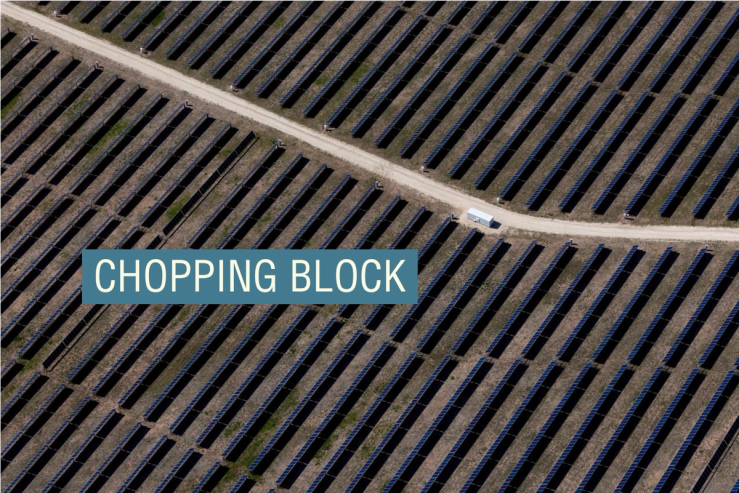The News
US House Republicans are narrowing in on a compromise within the party over the fate of some clean energy tax credits, and it’s less extreme than the wind and solar industries’ worst fears. Draft budget legislation released Monday targets nearly all of the clean energy tax credits in the Biden administration’s Inflation Reduction Act, with some listed for immediate repeal and others given new phaseout deadlines and hung with additional supply chain restrictions.
Some of the proposed cuts from the House of Representatives Ways and Means Committee, especially to EV credits, have been long-anticipated. On others — including credits for hydrogen and nuclear power, as well as a provision that allows the credits to be traded between investors — the draft takes a more aggressive posture than what will likely be able to survive scrutiny by more moderate Republicans in the full House and their peers in the Senate. But on the so-called “tech-neutral” production and investment credits, which primarily benefit wind and solar, a consensus is forming around the idea that they should be phased out earlier than originally planned but not killed overnight, Rep. Julie Fedorchak (R-N.D.) told Semafor.
The wind and solar credits, she said, are “providing the wrong incentive and signal to investors in energy projects. Right now, in the US, we need a lot more generation, but we don’t need a lot more wind and solar, because that’s what’s already flooding the queues.”
In this article:
Tim’s view
For renewable energy developers, the bottom line from the committee’s proposal is: Prepare to say goodbye to wind and solar credits sooner than you might prefer. Because of the exceptionally wide Republican majority on the Ways and Means Committee, and because many of the IRA’s more vocal Republican backers don’t sit on it, the draft that will go up for a vote today is probably in its most conservative iteration. It advances the phaseout of the wind and solar credits by three years relative to the IRA, and requires that they be operational by 2032, rather than merely under construction, to be eligible. Compared to the outright, immediate repeal a group of 38 House Republicans demanded this month, that’s not so bad.
The political animus many Republicans felt toward the IRA, as a manifestation of Biden’s “green new scam,” has been tempered by all the alarm bells that are now ringing about electricity shortages, which even US President Donald Trump has framed as a national “emergency.” Against that background, it’s less palatable to reflexively vote against tax incentives that put more electrons on the grid. Still, negotiations going forward will likely focus on the timing and the degree to which use of the credits should be constrained if the hardware contains parts from China or other problematic countries. It’s hard to imagine a bill reaching Trump’s desk in which the credits go unblemished.
“The goal for [Ways and Means committee chairman] Rep. Jason Smith (R-Mo.) is to cut enough from the IRA for conservatives, but still create a product that can potentially survive in the Senate. I think he’s gotten really close to the mark on that goal,” said Emily Domenech, senior vice president at the consulting firm Boundary Stone and former adviser to House Speaker Mike Johnson (R-La.).
Congressional Republicans, Domenech said, are more interested in solving the country’s energy problems through permitting reform than through spending taxpayers’ money. But it’s clear that if the solar and wind credits disappeared overnight, US power prices would jump up, because for most utilities renewables are the cheapest and fastest way to add power. So what Republicans are offering is a test of whether gas turbines or other power sources can catch up in the next few years.
The renewable energy industry is already bracing for a phaseout of tax incentives. In fact, the cuts proposed yesterday were sufficiently more lenient than industry investors had feared that the share prices for some large US solar companies jumped. Abigail Ross Hopper, CEO of the Solar Energy Industries Association, said her main goal in the congressional budget negotiation is to secure “as long as possible, for as much as possible, with as much consistency as possible.” She declined to comment on whether the solar industry will ever be ready to thrive without tax support. But she said uncertainty about the credits’ fate is already causing the $70 billion US solar industry to hit the brakes on spending and construction.
Quotable
“Federal incentives for clean energy development are some of the best tools we have to protect American energy independence, shore up domestic manufacturing, and attract cutting-edge industries to the US,” said Tom Starrs, vice president of government and public affairs at EDP Renewables North America.
The View From The Senate
Whatever Republicans manage to get past Democrats in the House, the battle will likely get tougher in the Senate, Sen. Catherine Cortez Masto (D-Nevada) told reporters. “Dismantling the IRA clean energy tax credits will kill jobs, it will create chaos in the business community, and it will raise energy costs for families already struggling to get by,” she said.
Meanwhile, Senate Republicans are still divided over whether to pull back California’s legal ability to set its own vehicle emissions standards, my colleague Burgess Everett reported.
Notable
- A growing number of US clean tech companies are thinking about relocating to the UK or Europe. Other Republican budget proposals this week asked for sweeping cuts to federal grants and loans that had been designed to entice large climate tech commercialization investments in the US.


